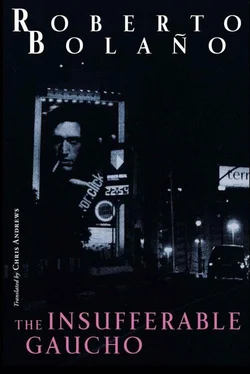Hear this. To the right hand side of the routine signpost (coming — of course — from north-northwest), right where a bored skeleton yawns, you can already see Comala, the city of death. This speech is bound for that city, mounted on an ass, as all of us in our various more or less premeditated ways are bound for the city of Comala. But before we get there, I would like to relate a story told by Nicanor Parra, whom I would consider my master if I was worthy to be his disciple, which I’m not. One day, not so long ago, Nicanor Parra received an honorary doctorate from the University of Concepción. The honor might have been conferred by the University of Santa Barbara or Mulchén or Coigüe; I’ve been told that in the '90s all you needed to start up a private university in Chile was to have finished primary school and secured the use of a reasonable sized house; it’s one of the boons of the free-market system. The University of Concepción, however, has a certain prestige; it’s a big university and still a state-run institution as far as I know, and a tribute to Nicanor Parra was organized there and they gave him an honorary doctorate and invited him to conduct a master class. So Nicanor Parra turns up and the first thing he explains is that when he was a kid or a teenager, he went to that university — not to study, but to sell sandwiches (sometimes called sánguches in Chile), which the students used to wolf down between classes. Sometimes Nicanor Parra went there with his uncle, sometimes he went with his mother, and occasionally he went on his own, with a bag full of sandwiches, wrapped not in albal foil but in newspaper or brown paper, and perhaps he didn’t carry them in a bag but in a basket, covered with a dish cloth, for hygienic and aesthetic and even practical reasons. And addressing that roomful of smiling southern professors, Nicanor Parra evoked the old University of Concepción, which was probably disappearing into the void, and continues to disappear, even now, into the void’s inertia or our perception of it; and he remembered his younger self: badly dressed, we can assume, wearing sandals and the ill-fitting clothes of a poor adolescent, and everything — even the smell of that time, a smell of Chilean colds and southern flus — was trapped like a butterfly by the question that Wittgenstein asks himself and us, speaking from another time, from faraway Europe, a question to which there is no answer: Is this hand a hand or isn’t it?
Latin America was Europe’s mental asylum just as North America was its factory. The foremen have taken over the factory now and the labor force is made up of escapees from the asylum. For over sixty years, the asylum has been burning in its own oil, its own fat.
Today I read an interview with a famous and shrewd Latin American author. They ask him to name three people he admires. He replies: Nelson Mandela, Gabriel García Márquez and Mario Vargas Llosa. With that answer as a starting point, you could write a whole thesis about the current state of Latin American literature. The casual reader might wonder what links those three figures. There is something that links two of them: the Nobel Prize. And there is something more that links all three: years ago they were all left wing. They probably all admire the voice of Miriam Makeba. All three have probably danced to her catchy hit song “Pata-pata,” García Márquez and Vargas Llosa in colorful Latin American apartments, Mandela in the solitude of his prison cell. All three have made way for deplorable heirs: the clear and entertaining epigones of García Márquez and Vargas Llosa, and, in the case of Mandela, the indescribable Thabo Mbeki, the current president of South Africa, who denies the existence of AIDS. How could anyone name those three, without batting an eyelid, as the figures he most admires? Why not Bush, Putin and Castro? Why not Mullah Omar, Haider and Berlusconi? Why not Sánchez Dragó, Sánchez Dragó and Sánchez Dragó, disguised as the Holy Trinity?
Declarations like that are a sign of the times. Of course, I’m prepared to do whatever’s necessary (though that sounds unnecessarily melodramatic) to ensure that the shrewd writer in question remains free to make that declaration or any other, according to his taste and inclinations — to ensure that everyone can say what they want to say and write what they want to write and publish it as well. I’m against censorship and self-censorship. But on one condition, as Alcaeus of Mytilene said: if you’re going to say what you want to say, you’re going to hear what you don’t want to hear.
The fact is, Latin American literature isn’t Borges or Macedonio Fernández or Onetti or Bioy or Cortázar or Rulfo or Revueltas or even that pair of old bucks García Márquez and Vargas Llosa. Latin American literature is Isabel Allende, Luís Sepúlveda, Ángeles Mastretta, Sergio Ramírez, Tomás Eloy Martínez, a certain Aguilar Camín or Comín and many other illustrious names that escape me for the moment.
The work of Reinaldo Arenas is already lost. And the work of Puig, Copi, Roberto Arlt. No one reads Ibargüengoitia any more. Monterroso, who might well have included Mandela, García Márquez and Vargas Llosa in his list of unforgettable figures (though maybe he would have replaced Vargas Llosa with Bryce Echenique), will soon be swallowed up by the mechanism of oblivion. This is the age of the writer as civil servant, the writer as thug, the writer as gym rat, the writer who goes to Houston or the Mayo Clinic in New York for medical treatment. Vargas Llosa never gave a better lesson in literature than when he went jogging at the crack of dawn. And García Márquez never taught us more than when he welcomed the Pope in Havana, wearing patent leather boots — García, not the Pope, who I guess would have been wearing sandals — along with Castro, who was booted too. I can still remember the smile that García Márquez was not quite able to contain on that grand occasion. Half-closed eyes, taut skin as if he’d just had a face-lift, slightly puckered lips, Saracen lips, as Amado Nervo would have said, green with envy.
What can Sergio Pitol, Fernando Vallejo, and Ricardo Piglia do to counter the avalanche of glamour? Not much. They can write. But writing and literature are worthless if they aren’t accompanied by something more imposing than mere survival. Literature, especially in Latin America, and I suspect in Spain as well, means success, by which, of course, I mean social success: massive print runs; translations into more than thirty languages (I can name twenty languages, but beyond twenty-five I run into trouble, not because I doubt that language number twenty-six exists, but because it’s hard for me to imagine the Burmese publishing industry or Burmese readers quivering with emotion at the magical-realist escapades of Eva Luna); a house in New York or Los Angeles; dinners with the rich and famous (as a result of which we learn that Bill Clinton can recite whole paragraphs of Huckleberry Finn by heart, or that President Aznar reads Cernuda); making the cover of Newsweek and landing six-figure advances.
Writers today, as Pere Gimferrer would be quick to point out, are no longer young men of means unafraid to inveigh against the norms of respectable society, much less a bunch of misfits, but products of the middle and working classes determined to scale the Everest of respectability, hungry for respectability. Blond- and dark-haired children of Madrid, born into the lower-middle class and hoping to end their days on the next rung up. They don’t reject respectability. They pursue it desperately. And in order to attain it they really have to sweat. They have to sign books, smile, travel to unfamiliar places, smile, make fools of themselves on celebrity talk shows, keep on smiling, never, never bite the hand that feeds them, participate in literary festivals and reply good-humoredly to the most moronic questions, smile in the most appalling situations, look intelligent, control population growth, and always say thank you.
Читать дальше












